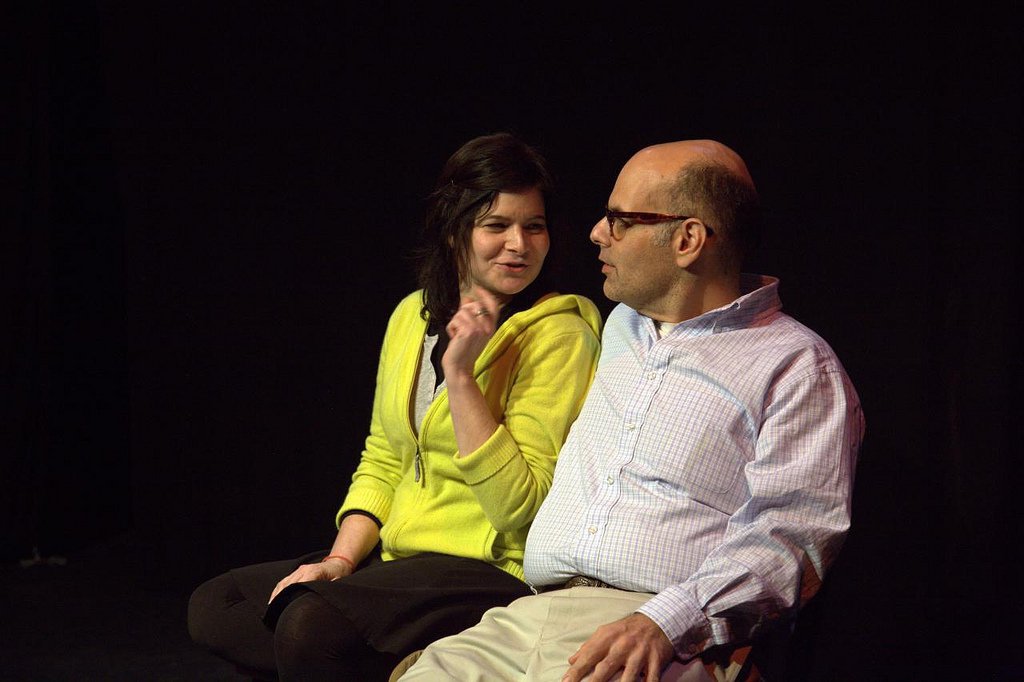The benefits of slowing your improv down

As I mentioned last week, if you are improvising today, you're probably doing it online -- on Zoom. And what I am finding is that slowing down your improv works especially well on Zoom.
Because improvising on Zoom is more like watching a film or TV show than a theater performance, gives you the opportunity to play the quiet moments more. Also, because of the technology, there is a slight delay when you speak, which automatically gives you an opportunity to take your time and absorb what your partner just said. When players ignore the delay they end up talking over the other players and getting lost in the scene.
So, this week, I am going to rerun this blog about slowing your improv down, and the principles I've outlined below apply to doing improv online as well as in person.
***
A lot of improvisers think that the only way to be funny is to play fast. But I’ve actually found that there are a lot of benefits to slowing your improv down.
I first learned how to play slow improv from Del Close at the Improv Olympic back in the ‘80s when he was teaching us The Harold. I fell in love with that style of improv, because I saw how it helped make my improv more honest. Over the years, I’ve seen long form improv speed up over the year, but I believe there’s still room to play this way. (I think TJ and Dave are masters of it.)
So when people ask me, “What is slow comedy?” I tell them it’s about being really patient on stage. It’s about really listening and focusing on what your partner is saying, and not saying. When you do that, you are really acting, and your work becomes more honest. Plus, I’ve found it makes improvising a lot easier.
Here are the three main benefits from slowing your improv down:
- It Helps You Become a Better Actor
Most improvisers think that their improv skills alone will get them work in TV and films. But what they don’t realize is that many of their improv heroes who have gone on to become famous are also very good actors. I think one of the reasons Second City actors have done so well over the years is that they not only learn how to improvise at Second City, but they also learn how to act.But guess what? You don’t always need to take an acting class to be a better actor. You can accomplish some of those same things by slowing your improv down. By not rushing to say something clever or funny, you’re giving yourself the space to feel your emotions, and also the space to sense what is going on emotionally with your scene partner. This lets you connect to your scene partner on a deeper emotional level, and you become so committed to the imaginary circumstances of your scene that you react to your partner in a natural way, like in life, which is the thing we are trying to imitate. - It Makes Improv Easier
Improvisers and actors come to improv class with a lot of baggage about what improv is supposed to be. Both actors and improvisers put pressure on themselves to be fast and funny. This is exhausting, and it doesn’t always work. For me, the goal in slow comedy is certainly to be funny, but in a different way. My philosophy is that by slowing your scenes down, you won’t have to invent something to make people laugh, but instead you’ll have a better chance of making discoveries off your partner. Everything you need for a scene is right in front of you, if you slow down and listen. Trust me, audiences want to see you have a good time. They don’t want to see you having to work so hard. - It Makes Your Scenes More Honest
Today more than ever, we need more honesty in comedy. That is the stuff that is relatable. That is the stuff that leaves an impact on an audience. That is the stuff that gets noticed (i.e. Kumail Nanjiani's The Big Sick or Hannah Gadsby's "Nanette.") Audiences are craving honesty, and that is one of the reasons improv has become so popular. By slowing down your improv, it forces you on a subconscious level to tap into your life experience. If you’re worried about making a quick edit or trying to think of something funny to say, you’re in your head and aren’t really present to your own emotions, so your improv isn’t coming from your heart. When you play slow, your point of view and your personality emerges and the audience gets to know you, without you having to even try. You don’t have to worry so much about trying to be original, because you will automatically be unique just by being yourself.
Hurry!! Only a few days left to sign up for Jimmy's Art of Slow Comedy Summer Intensive Aug. 1-2!

